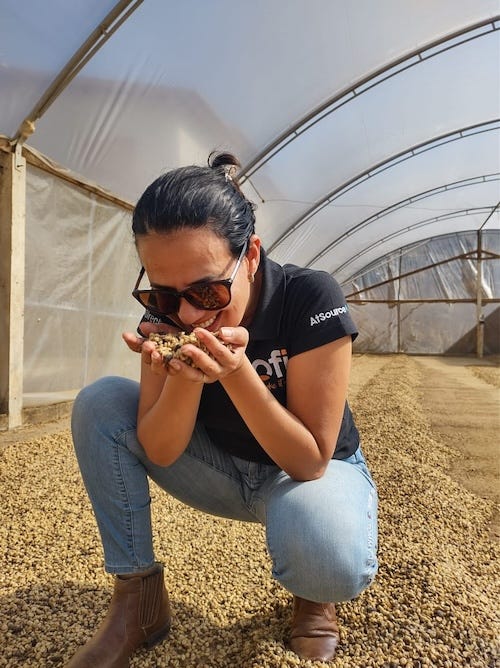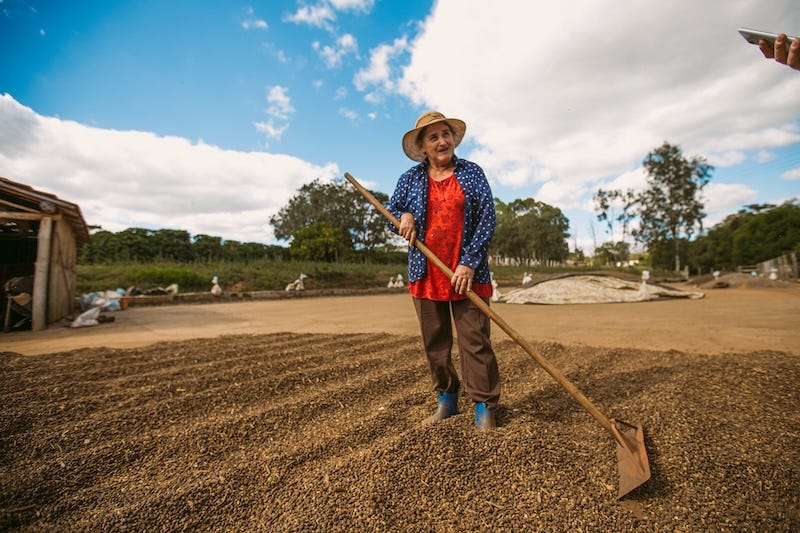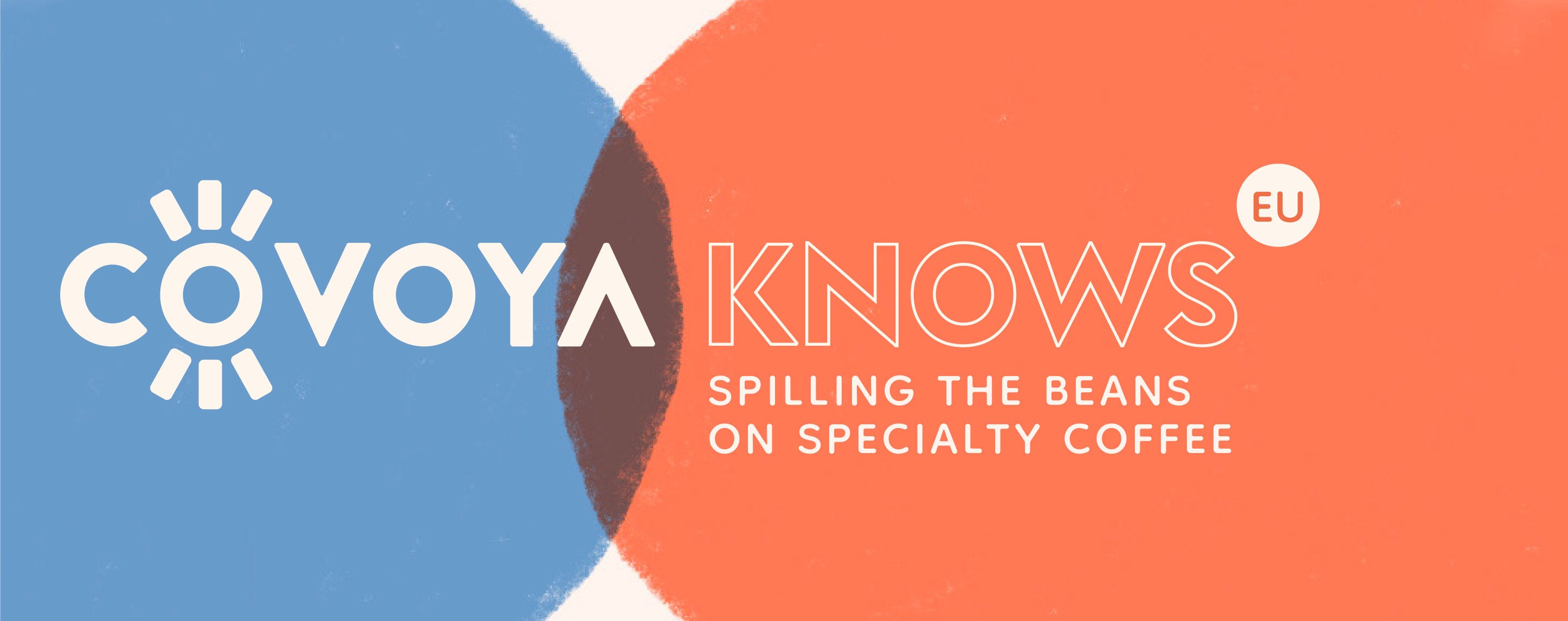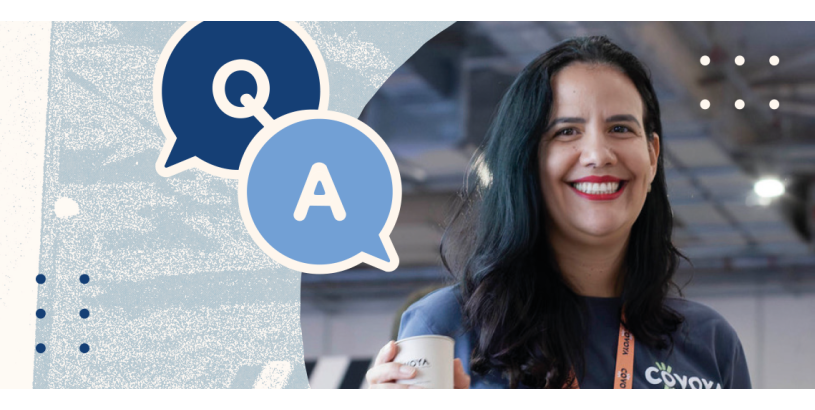In conversation with Camila Assis - Cafe Delas Manager for Brazil
Closing out our series on Women's History Month, Covoya's Marketing Co-ordinator Niki Toth sat down with Camila Assis, Specialty Coffee Supervisor for ofi Brazil, to discuss her experiences managing our Cafe Delas gender equity programme.
Cafe Delas is now a multi-origin gender equity program but its genesis was in Brazil. Key principles include farm-level traceability, financial independence, and the promotion of business leadership roles for women. Since 2021, 100% of our best selling coffee Eagle Monte Carmelo, has been sourced through our Cafe Delas programme*. This means every lot has been sourced 100% from a woman-owned and operated farm and a dedicated premium is included to finance the program. In the last 4 years we, together with our customers, we have raised over $75,000 via these premiums.


Brazil Cafe Delas, with Camila Assis
NT: Hi Camila, Can you tell us a bit about how Cafe Delas came to be?
CA: In March 2018, the specialty coffee division created "Cafe Delas" with the purpose of promoting female empowerment in coffee. The name "Cafe Delas" ('her coffee' in Portuguese) comes precisely from this idea: this is their coffee – grown, cared for and led by women. We started with only 6 producers in Paraná, who embraced the idea of telling their stories through coffee. Since then, the programme has grown significantly and today we work with more than 135 women across different regions of Brazil (Cerrado Mineiro, Mogiana, South of Minas, Matas de Minas, Espírito Santo and Bahia). We have also expanded the programme to other origins: Colombia, Honduras, Peru, Mexico and Guatemala.
NT: How does Cafe Delas contribute to the work of women coffee producers?
CA: The programme helps bring knowledge, training and exchange of experiences for the producers to apply in their daily lives. I always say that at each meeting or lecture, the exchange of experiences and conversations over coffee, always makes them leave with something different in their minds and their hearts.
NT: How long have you been managing Cafe Delas and what does your role include on a daily basis?
CA: I began managing the programme in 2022, recording all purchases from female producers who sell us specialty coffees. After this recording, the stock volume of each producer is calculated, showing us the current balance of each producer. There are also producers who sell us specialty coffees but are not in our database, so we check with the branch if the producer fits to be part of our Cafe Delas programme. If she is a producer who performs any activity on the farm, we include her and start inviting her to the training sessions. All sales are recorded so that we can account for the premium received, then a producer info pack is shared with our marketing offices. Before planning the training sessions, we first analyze what the producers in that region are seeking to learn. After that, we hire speakers and organise workshops according to their needs. For me, knowledge is never too much. When we are united, I see that women have a support network through the programme, which is extremely gratifying. It's especially inspiring to see how close-knit and willing they are to collaborate with each other.
"What inspires me is to see that this is changing: there are more and more women leading at all stages of the coffee chain. I would like to see more equity in access to land, credit and decision-making. And that women have space to innovate, undertake and transform their communities through coffee."
NT: As a woman yourself, can you tell us a bit about your experience working in the coffee industry? What changes would you like to see in the industry to increase opportunities for women?
CA: My journey in coffee since 2005 has been one of a lot of learning and growth, but also of facing challenges common to many women – such as the need to constantly prove our competence in an industry historically dominated by men. What inspires me is to see that this is changing: there are more and more women leading at all stages of the coffee chain. I would like to see more equity in access to land, credit and decision-making. And that women have space to innovate, undertake and transform their communities through coffee.
NT: What unique challenges do women producers face and how does Cafe Delas help overcome those?
CA: The challenge I see the most is gender inequality. At fairs and meetings, I see that they have difficult access to financing and technology. Also, the issue of recognition and visibility is underestimated, making it difficult to recognise their work and leadership. Cultural and social barriers are also points that make it difficult for women to make important decisions on the property.
NT: The stated goal of Cafe Delas is to "empower women". But what does that really look like for a Brazilian farmer and how can you measure it?
CA: Empowering, in practice, means providing conditions for women to be recognized as protagonists – at home, in the field and in the market. For a Brazilian producer, this can translate into having its own sales contract, deciding on the investments of the property, participating in training, having an active voice in cooperatives and associations. To measure this, we use internal indicators that assess female participation in productive decisions, access to credit, land ownership, and income evolution, especially with the increase in sales on behalf of women.
NT: Can you share any special stories where Cafe Delas outstandingly impacted a female farmer?
CA: In the words of one of our Cafe Delas producers Dalila Vasconcelos dos Santos Leonel : "I always worked with coffee, but I didn't know what coffee was; after I met ofi, met the coffee through courses I started improving more and more, and now I see how pleasant it is to know every step of it, the taste, the fruit, produce specialty coffee, which I did not even know existed, and today I am passionate and want to learn more and more!"
"Our goal is not only to grow in number of regions, but to strengthen local networks of women who share knowledge, opportunities, and inspiration."
NT: We know that every sale of Cafe Delas coffee includes a small premium which is ring-fenced to be used for gender equity initiatives at origin. How much money is raised and how exactly is it used?
CA: There is a 5 US-cents-per-pound premium added to every coffee which is used exclusively to fund the Cafe Delas programme. For each bag of coffee sold, ofi invests 3 cents per pound in actions such as training, courses, and events to educate the producers. The training is adapted to the realities of each community and covers three main pillars: technical training, social empowerment and financial education. The women learn about good agricultural practices, post-harvest management and coffee quality; but also about leadership, self-esteem, gender equality and property management. Many trainings are conducted by other women, which creates an environment of confidence and inspiration.
Additionally, 1 cent per pound goes towards the administration of the programme, and 1 cent per pound goes to the producer at the time of the coffee purchase.
NT: What does the future look like for the Cafe Delas programme?
CA: We increasingly want to bring the programme to regions that do not yet have access. Brazilian regions are vast, so we see that many producers can benefit from our programme. We started in Minas Gerais and have already expanded to São Paulo, Espírito Santo and Bahia. Now, we are looking carefully at the Cerrado Mineiro and the south of Bahia, where there are groups of producers with great potential and interest in being part of the movement. Our goal is not only to grow in number of regions, but to strengthen local networks of women who share knowledge, opportunities, and inspiration. There are so many small cities that we can access using our programme, so it’s something that we need to do more. We envision a future where more and more women are included in the coffee sector, actively participating in their properties. This contributes not only to their families but also to the communities they live in.
*100% of all spot coffee sold via our website and offer list








